November 5th - A lot of time is spent on the ship checking the weather forecast to see how the weather will evolve. There is a very strong wind outside.
They also arrive, here in the port, the gusts that make the masts swing and around it the noise of the halyards is heard. A typical noise
Let's look at the instruments: the anemometer registers gusts of 30-40 knots. The day is bright and apart from the wind it looks like a spring day.
We leave for the meeting on the Peace Boat in a messy order, some in the car with René and Magda, others by bus; Someone thought to walk before realizing that they will have to cross the entire commercial port. A march of at least one hour.
Peace Boat is a cruise ship operated by the Japanese NGO of the same name, which has been committed to spreading the culture of peace, nuclear disarmament, the defense of human rights and the sustainability of the environment for 35.
The ship makes cruises all over the world and during the stops on board there are activities open to the public and pacifist groups.
In the stage of Barcelona, in which we will also participate the Mediterranean Sea of Peace
In the Barcelona stage, in which we will also participate Mediterranean Sea of Peace, the documentary “The Beginning of the End of Nuclear Weapons” will be screened, produced by the international press agency Pressenza.
Then there will be a series of interventions, Alessandro will speak for us.
We arrived well in advance to prepare the conference room. Moving from the confined spaces of Bamboo to the halls of the Peace Boat has a certain effect and we also risk losing ourselves up and down the ship's elevators.
Apart from this small inconvenience, for the rest we are a well-rounded team: after half an hour we place the exhibition Colors of Peace, the flag of the Mediterranean Sea of Peace, the flag of the March in Italian and the flag of the Embassy of Peace , the network of peace embassies also supported by the Mayor of Palermo, Leoluca Orlando.
The idea is to involve not only States, but also cities, individual communities of citizens in a network that drives disarmament in the Mediterranean and dialogue between countries. Sometimes citizens understand each other better.
Inma Prieto does the honors
Our Inma Prieto does the honors, the "charming presenter" is excited but doing very well. Starts.
Nariko, the Hibakusha, reads a poem of his accompanied by a cellist. Then it's up to María Yosida, director of the Peace Boat, to tell the story of the Peace Boat mission. After her, Inma announces the documentary. Darkness in the room.
"The Beginning of the End of Nuclear Weapons" traces the history of the atomic bombs dropped on Japan and the entire long journey of campaigns for nuclear disarmament, from those initiated during the Cold War to the recent ICAN, International Campaign for Abolition of Nuclear Weapons, awarded the Nobel Peace Prize in 2017 (the prize is on view).
Ican marked a radical change in the pace of global mobilizations for nuclear disarmament, meanwhile because it was a global mobilization of civil society and then because it changed the view on disarmament by first including in the debate the issue of the humanitarian crisis that would follow a possible use of nuclear weapons.
A nuclear war is an endless war
The Japanese case and that of the countries where nuclear tests were conducted, in the Pacific, Kazakhstan and Algeria, provided the theoretical and documentary basis for the new approach. A nuclear war is an endless war, whose consequences are prolonged.
Radiation destroys not only people, but also their livelihoods: water, food, air. A real risk, especially today, when the end of the Cold War blocks opened the way to nuclear weapons to countries with authoritarian and antidemocratic regimes.
In recent years, the world has been several times about to be overwhelmed by a nuclear war.
Everyone remembers the case of Stanislav Petrov, the lieutenant colonel of the Soviet army, who in front of the computers announcing a US nuclear attack against the USSR decided not to react.
He did not press the button and the atomic war did not begin. The computers were wrong, but if I had obeyed the orders, we wouldn't be here today to tell.
There have been five other documented cases in addition to those of Petrov. So, to put it in the words of one of the protagonists of the film: the question is not if it will happen again, but when it will.
There has been talk of nuclear weapons as deterrents
For years, nuclear weapons have been talked about as deterrents. The thesis is more or less this: since there is a risk of a global holocaust, wars will be reduced.
Just look at a newsletter to understand that conventional wars have not stopped.
Not to mention that technological evolution now makes it possible to manufacture smaller nuclear weapons that could be used in "conventional" wars.
You leave the documentary film with the feeling of urgency: disarmament and prohibition of nuclear weapons immediately!
Among the following interventions, what catches our attention is David Llistar, director of the Department of Global Justice and International Cooperation of the Barcelona City Council.
Barcelona has begun to distance itself from the banks that finance the arms trade
It goes straight to the point: banks and weapons. The city of Barcelona has begun to distance itself from the banks that finance the arms trade and 50% of the credit lines have opened it with Ethical Banking and the Bank of Spain.
The goal is to gradually reach 100%. It also explains what may be the role of municipal administrations in the nuclear disarmament network: act as a transmission belt between citizens and central authorities. Proposals that make us think.
After the interventions of Tica Font from the Centro Delas d'estudis per la Pau, Carme Sunye from Fundipau and our Alessandro from the Danilo Dolci association in Trieste, it is time for Rafael de la Rubia, promoter and coordinator of the World March.
We are all curious. Born in 1949 in Madrid, Rafael has decades of pacifist activity behind him. He is a humanist and founder of the World without War and Violence movement. During the Franco dictatorship he was in prison for being a conscientious objector, and was also imprisoned in Pinochet's Chile for being a member of the humanist movement.
Bookseller, publisher, writer and translator, his is a long march for peace, which began fifty years ago and has not yet ended. He doesn't seem like a leader who bullies the crowd, but rather someone who knows that the road to peace and non-violence is an uphill one. "Let's do what we can, step by step," he says.
We think about the weather that has been set aside. Tomorrow we will return to the sea and try to reach Tunisia.
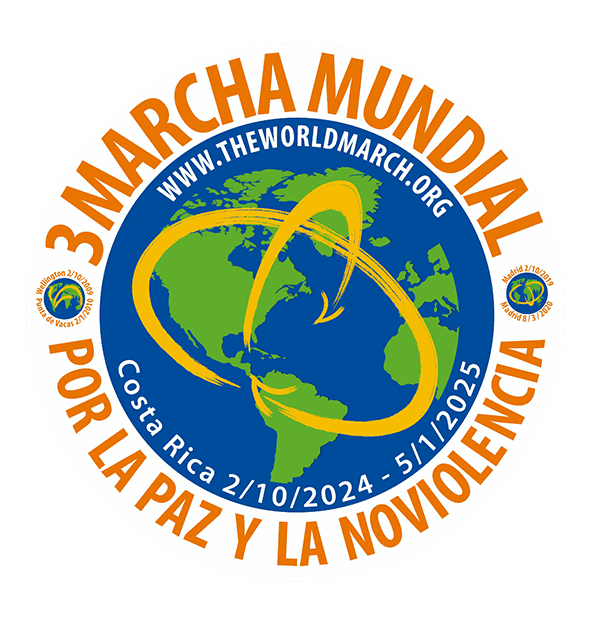
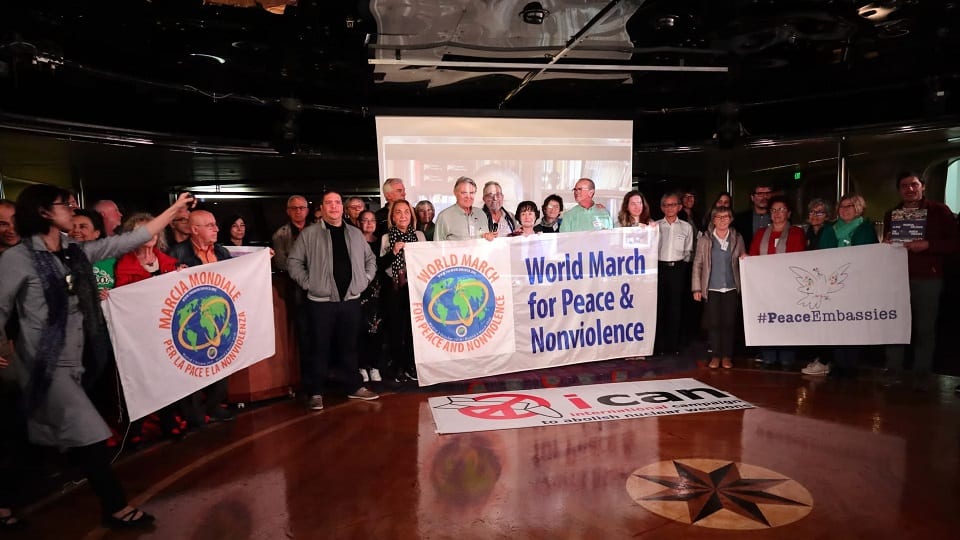
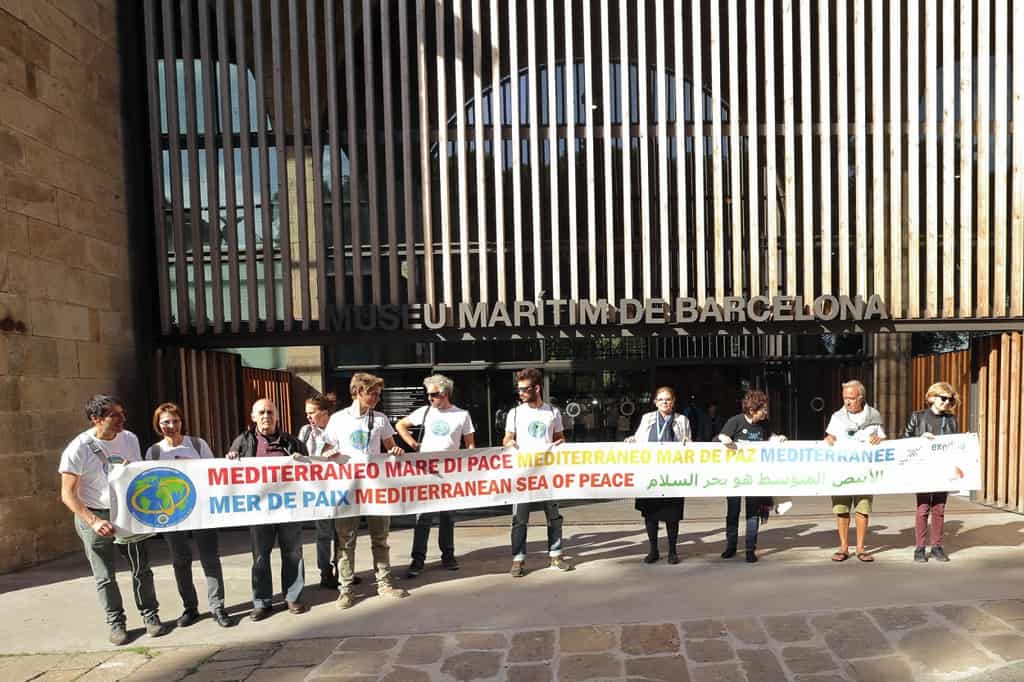
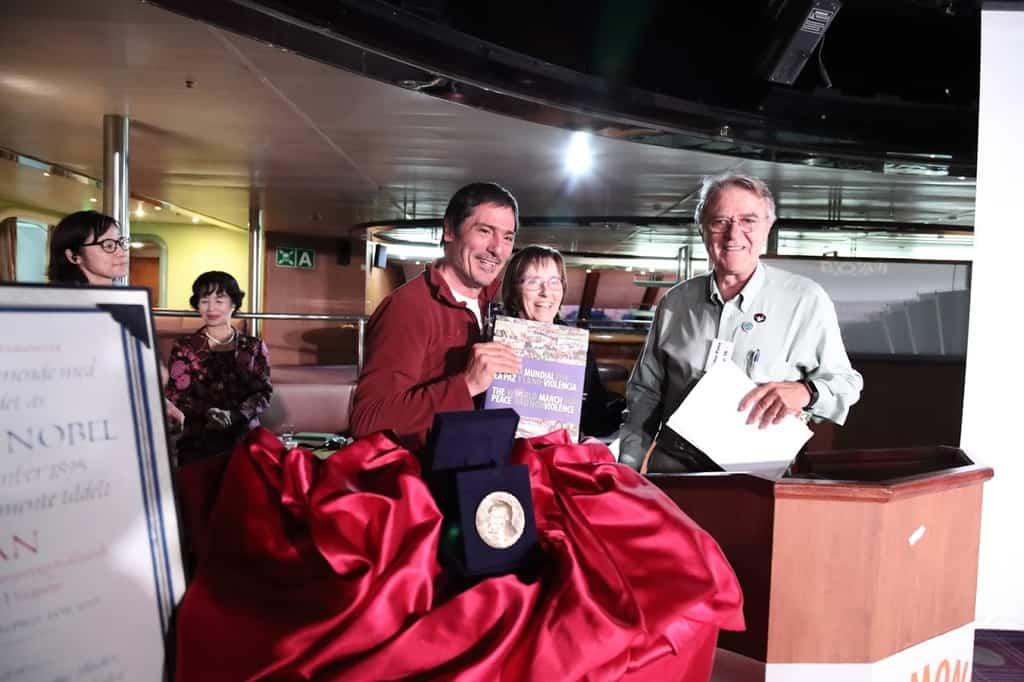
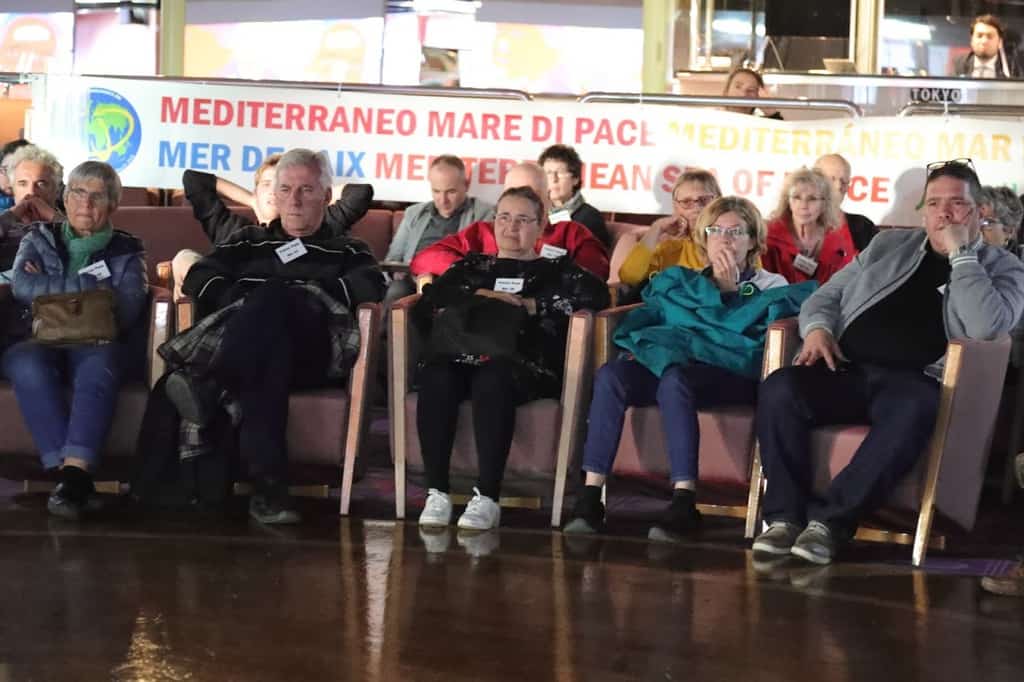
2 comments on “Logbook, November 5”